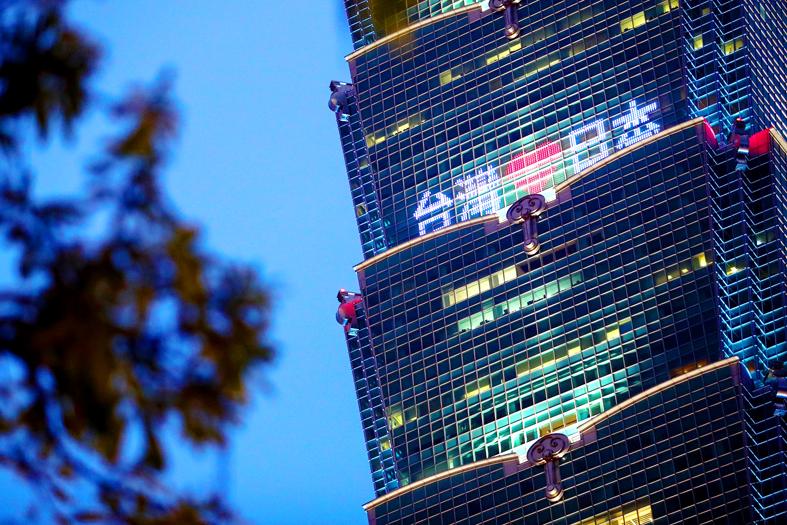Most people in Taiwan regard Japan as the world’s most likable country, a survey released yesterday by the Japan-Taiwan Exchange Association said.
Sixty percent of the respondents chose “Japan” when asked to name their “most likable country/region.”
China and the US polled at 7 percent and 6 percent respectively.

Photo: CNA
Sixty-eight percent of people from eastern Taiwan named Japan as the most likable, followed by 65 percent in the south choosing Japan, 59 percent in central Taiwan and 57 percent in the north, it showed.
In terms of age, 73 percent of those who chose Japan were in their 30s, followed by 71 percent in their 40s, 65 percent in their 20s, 51 percent above 65, and 47 percent aged 50 to 64.
Another question asked: “What country/region should Taiwan grow closer to?”
Japan was named by 46 percent of respondents, followed by the US at 24 percent and China at 15 percent, the poll showed.
On this question, 55 percent from eastern Taiwan named Japan, 50 percent in the central region, 45 in the south and 44 percent in the north.
By age, 57 percent were in their 40s, 54 percent in their 30s, 50 percent in their 20s, 41 percent above 65, and 34 percent aged 50 to 64.
The poll also showed that 70 percent of respondents considered the relationship between Japan and Taiwan as “good” — up 17 percentage points from the previous poll in 2019 — and only 2 percent considered the relationship as “bad.”
Sixty percent of the respondents saw Japan as trustworthy — up 10 points from the 2019 poll. Eight percent said the opposite.
Asked whether they felt close to Japan, 77 percent of the respondents answered “yes” — up from 70 percent from the 2019 poll — and 6 percent said “no.”
Taiwanese have grown to like and trust Japan more, and have a more positive attitude toward the relationship between the two countries, the association said.
The poll was conducted from Jan. 5 to Jan. 20 among people in Taiwan, aged 20 to 80, the association said, adding that it collected 1,068 valid samples with a margin of error of 3.06 percent.
Additional reporting by CNA

The Chinese military has built landing bridge ships designed to expand its amphibious options for a potential assault on Taiwan, but their combat effectiveness is limited due to their high vulnerability, a defense expert said in an analysis published on Monday. Shen Ming-shih (沈明室), a research fellow at the Institute for National Defense and Security Research, said that the deployment of such vessels as part of the Chinese People’s Liberation Army (PLA) Navy’s East Sea Fleet signals a strong focus on Taiwan. However, the ships are highly vulnerable to precision strikes, which means they could be destroyed before they achieve their intended

The first two F-16V Bock 70 jets purchased from the US are expected to arrive in Taiwan around Double Ten National Day, which is on Oct. 10, a military source said yesterday. Of the 66 F-16V Block 70 jets purchased from the US, the first completed production in March, the source said, adding that since then three jets have been produced per month. Although there were reports of engine defects, the issue has been resolved, they said. After the jets arrive in Taiwan, they must first pass testing by the air force before they would officially become Taiwan’s property, they said. The air force

GLOBAL: Although Matsu has limited capacity for large numbers of domestic tourists, it would be a great high-end destination for international travelers, an official said Lienchiang County’s (Matsu) unique landscape and Cold War history give it great potential to be marketed as a destination for international travelers, Tourism Administration Director General Chen Yu-hsiu (陳玉秀) said at the weekend. Tourism officials traveled to the outlying island for the Matsu Biennial, an art festival that started on Friday to celebrate Matsu’s culture, history and landscape. Travelers to Matsu, which lies about 190km northwest of Taipei, must fly or take the state-run New Taima passenger ship. However, flights are often canceled during fog season from April to June. Chen spoke about her vision to promote Matsu as a tourist attraction in

PAWSITIVE IMPACT: A shop owner said that while he adopted cats to take care of rodents, they have also attracted younger visitors who also buy his dried goods In Taipei’s Dadaocheng (大稻埕), cats lounging in shops along Dihua Street do more than nap amid the scent of dried seafood. Many have become beloved fixtures who double as photography models, attracting visitors and helping boost sales in one of the capital’s most historic quarters. A recent photo contest featuring more than a dozen shop cats drew more than 2,200 submissions, turning everyday cat-spotting into a friendly competition that attracted amateur and professional photographers. “It’s rare to see cats standing, so when it suddenly did, it felt like a lucky cat,” said Sabrina Hsu (徐淳蔚), who won the NT$10,000 top prize in